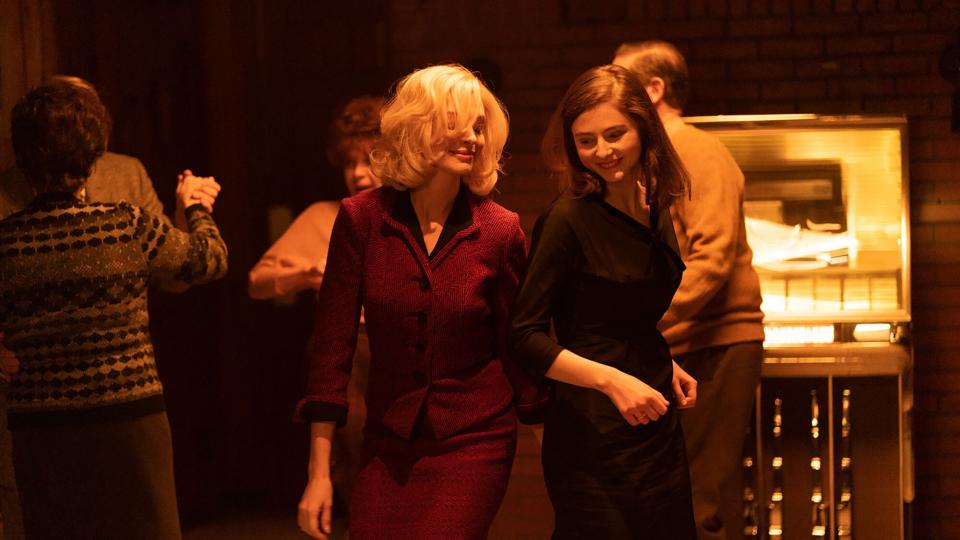'Eileen' review: Anne Hathaway is electric in a wild Hitchcockian noir
- Oops!Something went wrong.Please try again later.
- Oops!Something went wrong.Please try again later.
- Oops!Something went wrong.Please try again later.
- Oops!Something went wrong.Please try again later.
"Some people, they're the real people, like in a movie — they're the ones you watch," a man (Shea Whigham) tells his grown daughter (Last Night in Soho's Thomasin McKenzie) with casual cruelty. "Other people, they're just filling space…That's you, Eileen."
He's a mean drunk, and a messy one — an alcoholic ex-cop too gone most days to get out of his bathrobe — but he's not wrong: At 24, Eileen is a mousy shadow, a pale nonentity going through the motions of a life in circa-1964 Massachusetts. Essentially an unpaid handmaiden to her widowed dad, she is benevolently tolerated or simply ignored by pretty much everyone else in their coastal blue-collar town, including her coworkers at the local juvenile prison where she does clerical work (though that doesn't stop her from furiously masturbating to her fantasies about a handsome, brooding guard, or the couples on lovers' lane whose steamed-up cars she likes to park behind).

Courtesy of Sundance Institute
Enter Rebecca Saint John (Anne Hathaway), a blonde goddess in a pencil skirt and the impetus of all that comes next in Eileen, a marvelously uneasy thriller soaked in simmering eroticism, Hitchcockian swivels, and wintry New England atmosphere. Readers of the 2015 novel of the same name by Ottessa Moshfegh (My Year of Rest and Relaxation) know what comes next; the rest might want to put on their seatbelts. (Director William Oldroyd's lush midcentury vision will have you thinking of Todd Haynes, but the psychosexual dance here is something else: Carol's sinister sister).
Rebecca is the new psychologist at the prison, a Harvard PhD brought in to introduce modern ideas of reform. Eileen is as a dazzled and confounded by her movie-star presence as everyone else, and shocked when Rebecca makes friendly overtures; how has she been singled out by this exotic creature? Soon they're sharing girlish confidences and going out for cocktails, and Eileen is shedding her sad cardigans for nipped-waist dresses, furs, and vampish lipstick. (Even in that, though, she's a little bit off; the clothes are her late mother's, glamorous relics of a recent but extinct era).
One night after many drinks, Rebecca even kisses her on the lips. She always seems to have time for Eileen, and they share a fascination with the case of a teenage inmate (White Noise's Sam Nivola) who killed his father in his sleep; he's never said why he did it, and his mother (an incandescent Marin Ireland) won't say a word either. If she can draw him out with her new techniques, Rebecca believes, she can heal him.
Working with her husband, Luke Goebel, Moshfegh has written a brisk, noirish script more generally palatable and cinematic than the novel, but still very much in line with the feverish brand of female interiority and body horror she's known for. McKenzie, the young New Zealand actress so good in films like Jojo Rabbit and Leave No Trace, is a naturally sweeter Eileen, though a whole volcano thrums under her obedient, watchful exterior. And Hathaway eats her scenes, finding both the ferociousness and calculation beneath Rebecca's beauty and the wounded humanity.
Oldroyd (who also made 2016's pleasingly unhinged Florence Pugh drama Lady Macbeth) is British, but he seems to revel in the Dennis Lehane color of his outer-Boston setting, and the great character actors (Whigham, Ireland, Siobhan Fallon Hogan) he has at his disposal. For all its heavy themes — and the truly wild turn it takes in the third act — it's also a surprisingly funny movie, shot through with visual wit and off-kilter comedy. And lurid triumph, too: By the last frame, Eileen isn't filling space; she's the star, finally, of her own movie. Grade: A–
Related content:

